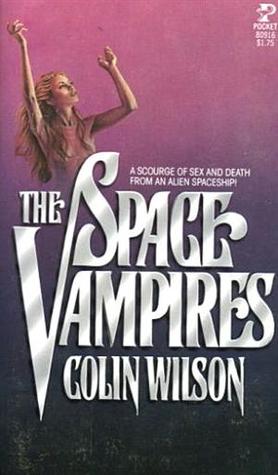 By COLIN WILSON (Pocket; 1976)
By COLIN WILSON (Pocket; 1976)
This interesting sci fi-tinged take on vampirism was made into the crappy movie LIFEFORCE. Don’t let that put you off, though, as the book is a careful and methodical intellectual thriller—though maybe a bit too methodical.
Colin Wilson is an insanely prolific English writer and philosopher (of sorts), having churned out several dozen books on various subjects, including biographies on Rasputin and Aleister Crowley, a study of A VOYAGE TO ARCTURAS author David Lindsay, the classic nonfiction survey THE OUTSIDER, and a few H.P. Lovecraft-inspired horror/sci fi novels. THE SPACE VAMPIRES was the third of those novels (following THE MIND PARASITES and THE PHILOSOPHER’S STONE), and furthers the Lovecraft connection in its account of vampiric beings from outer space who drain peoples’ life force—and who may or may not be our distant ancestors.
The vamps first turn up in a deserted space craft hovering just outside the Earth’s orbit. A group of astronauts are sent to investigate, among them the cool, rational Carlsen, who feels a strange compulsion upon entering the craft. It seems he harbors dormant vampiric powers which rise to the forefront once he’s back on Earth.
The story at this point takes an intriguing turn. Among Colin Wilson’s myriad publications are several books, fiction and non, on criminology, and the present narrative comes to pivot on crime and psychosis. The vampires’ behavior is directly linked to that of rapists and/or serial killers, with Carlsen and his colleagues zipping around the UK in search of traces of the vamps (who travel from body to body). We even learn of another race of extraterrestrial beings hunting the space vampires, sort of like an interplanetary police force.
It’s all a fair amount of fun, being fast moving and extremely well imagined. I just wish the writing were a little more expressive. Wilson has claimed he’ll “leave to other writers the challenge to make people feel emotions,” but in a story dealing with the seduction of vampirism—complete with several explicitly described sexual episodes—a more sensuous approach would have benefited, more in line with INTERVIEW WITH THE VAMPIRE or Whitley Streiber’s THE HUNGER, because as it is the book is much closer to A BRIEF HISTORY OF TIME.
